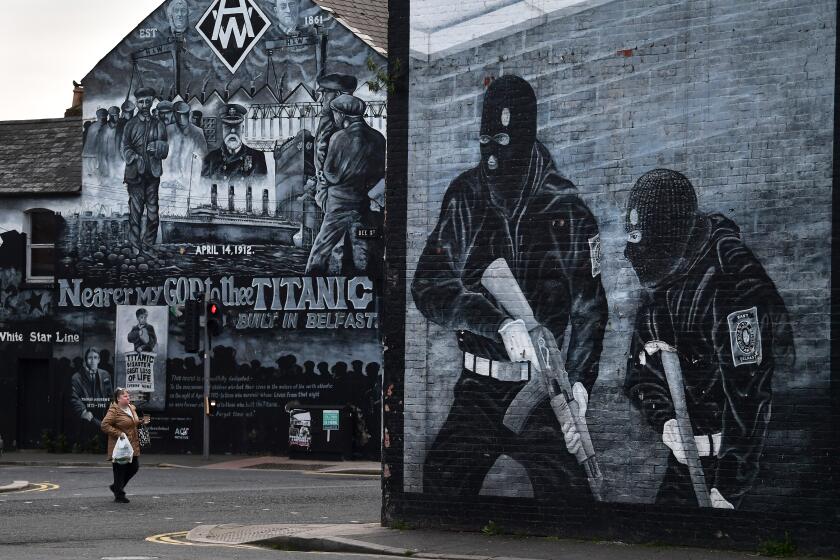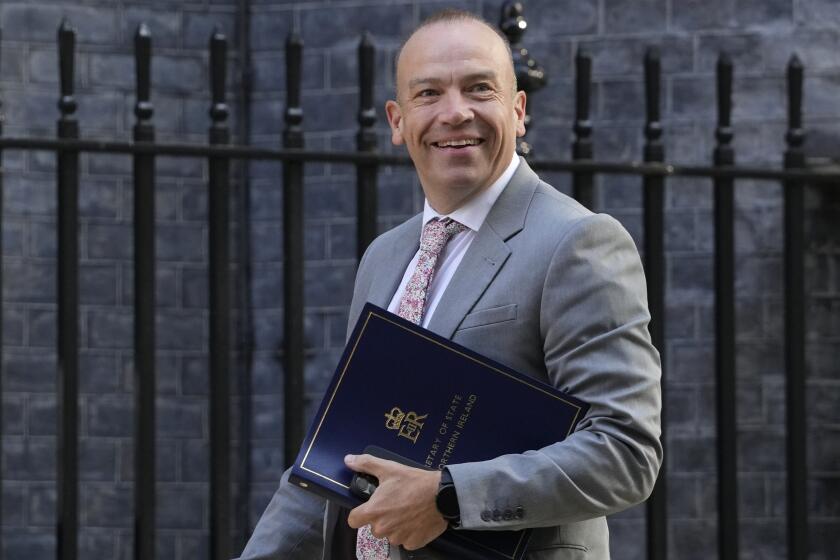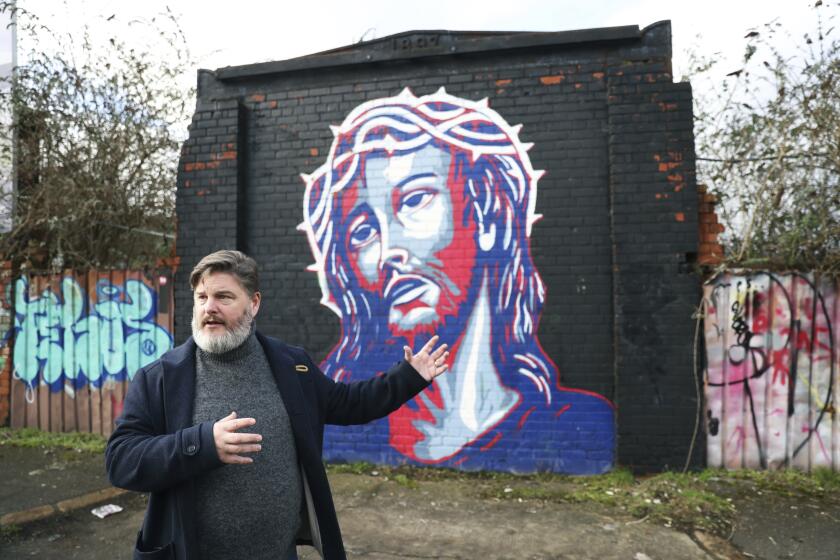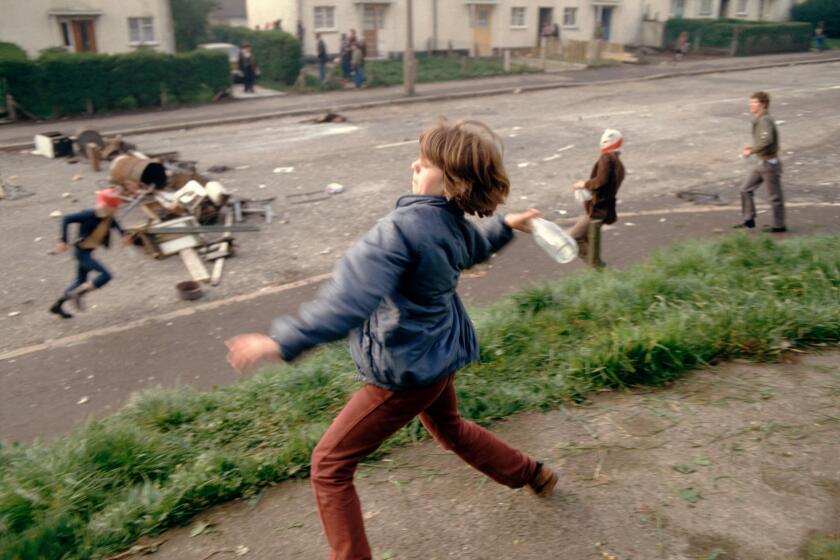Northern Ireland party agrees to end 2-year boycott that caused government to collapse

LONDON — Northern Ireland’s largest British unionist party has agreed to end a boycott that left the region’s people without a power-sharing administration for two years and rattled the foundations of the 25-year-old peace. The breakthrough could see the shuttered Belfast government restored within days.
After a marathon late-night meeting, Democratic Unionist Party leader Jeffrey Donaldson said the party’s executive had backed proposals to return to the government. He said agreements reached with the central British government in London “provide a basis for our party to nominate members to the Northern Ireland Executive, thus seeing the restoration of the locally elected institutions.”
The breakthrough came after the central government last week gave Northern Ireland politicians until Feb. 8 to restore the collapsed government in Belfast or face new elections.
“All the conditions are in place for the assembly to return,” Northern Ireland Secretary Chris Heaton-Harris said. He said he would publish details of the central government’s new proposals Wednesday after briefing all of Northern Ireland’s main political parties.
The DUP walked out in February 2022 in a dispute over post-Brexit trade rules. It has since refused to return to the power-sharing government with the Irish nationalist party Sinn Fein. Under rules established as part of Northern Ireland’s peace process, the administration must include both British unionists and Irish nationalists.
The walkout left Northern Ireland’s 1.9 million people without a functioning administration to make key decisions as the cost of living soared and backlogs strained the creaking public health system. Amid mounting frustration, teachers, nurses and other public-sector workers in Northern Ireland staged a 24-hour strike this month calling on politicians to return to the government and give them a long-delayed pay raise.
Northern Ireland wants to move forward. But 25 years after the Good Friday accord celebrated by Clinton and Biden, many are mired in a painful past.
The British government has agreed to give Northern Ireland more than $3.8 billion for its public services, but only if the executive in Belfast gets back up and running.
Katy Hayward, professor of political sociology at Queen’s University Belfast, said the DUP leader had concluded that the party’s boycott had reached “the end of the road.”
“Jeffrey Donaldson thought that the time was running out,” she said. “This was his opportunity — he had to jump.”
The political impasse in Northern Ireland stems from Britain’s decision to leave the European Union and its borderless trading bloc after decades of membership. The DUP quit the Northern Ireland government in opposition to new trade rules put in place after Brexit that imposed customs checks on and other hurdles for goods moving into Northern Ireland from the rest of the U.K., primarily meaning England, Scotland and Wales.
Despite opposition, Britain passes law to curb prosecutions for Northern Ireland ‘Troubles’ violence
Despite widespread opposition, Britain’s Parliament has passed a law that sets out to lay the ghosts of decades of violence in Northern Ireland to rest.
The checks were established to maintain an open border between Northern Ireland and its EU neighbor, the Republic of Ireland, a key pillar of Northern Ireland’s peace process that ended decades of violence. The DUP, though, says the new customs border with the rest of the U.K. undermines Northern Ireland’s place in the U.K.
In February 2023, Britain and the EU agreed on a deal to ease customs checks and other hurdles for goods moving to Northern Ireland from the rest of the U.K. But it was not enough for the DUP, which continued its government boycott.
Donaldson said further measures agreed to by the British government will mean “zero checks, zero customs paperwork” on Northern Ireland-bound goods.
The DUP’s decision faces opposition from some hard-line unionists, who fiercely guard Northern Ireland’s place in the U.K. and say even light-touch post-Brexit checks create a de facto internal trade barrier. Dozens of protesters gathered outside the DUP meeting venue outside Belfast late Monday, waving placards saying, “Stop DUP sellout.”
Twenty-five years ago, the Good Friday Agreement halted much of the violence of Northern Ireland’s Troubles.
Details of the supposedly private five-hour meeting were live-tweeted by Jamie Bryson, editor of the Unionist Voice newsletter, who is opposed to Donaldson’s attempts at compromise.
Donaldson said last week that he had received threats over his attempts to negotiate a return to the government.
“I think my party has displayed far more courage than those who threaten or try to bully or try to misrepresent us,” he said Tuesday. “We are determined to take our place in taking Northern Ireland forward.”
The situation has been complicated by Northern Ireland’s changing political landscape. Unionists were the largest force in the Northern Ireland Assembly from its establishment in 1998 until 2022, when Sinn Fein won the most seats in an election.
Personal testimony from all sides fuel a five-part look on PBS by director James Bluemel at Northern Ireland over 30 years of political and sectarian violence.
That gives the nationalist party, which seeks to take Northern Ireland out of the U.K. and unite it with the Irish republic, the right to hold the post of first minister. The DUP would fill the post of deputy — a bitter pill for some unionists to swallow.
Sinn Fein President Mary Lou McDonald said the appointment of Northern Ireland’s first nationalist leader would be “a moment of great significance” that would bring a united Ireland closer.
Hayward agreed that it was “hugely significant in symbolic terms, if not in practical terms, because it’s a joint position” with the deputy role.
“International headlines about that — the first time you have a Sinn Fein first minister — are the kind of headlines that the DUP [has] been dreading,” she said.
More to Read
Sign up for Essential California
The most important California stories and recommendations in your inbox every morning.
You may occasionally receive promotional content from the Los Angeles Times.














